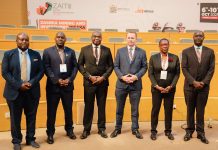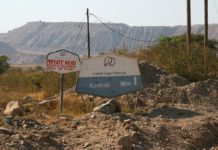AngloAmerican is a mining company whose operations straddle the globe. It made $1.6 billion of profit in 2016, employed more than 87 000 people, and paid $3.6 billion in wages and benefits.
How does a Zambian schoolboy from St. Canisius Secondary School in Southern province go on to become the deputy-Chairman of the South African arm of this powerful mining conglomerate? The answer: with a plan, and no small measure of ambition.
Norman Mbazima always knew what he wanted to do in life, as the Zambian mining industry found out to its surprise in 1976, when he politely declined their scholarship offer to study engineering overseas.
Norman Mbazima went to St. Canisius Secondary School, in Southern Province
“Back then, all the best students were handpicked by the mining industry to go to the UK and get a degree in some kind of engineering – whether mining, mechanical or electrical,” he recalls. “But I wanted to do accounting.”
Mbazima motivated his case to the scholarship department of the then Roan Consolidated Mines (RCM) and National Consolidated Copper Mines (NCCM). It no doubt helped that he was uncommonly gifted in his studies, having sailed through school at the top of his class. “Somebody gave me a brain,” he says. “I’ve never had to burn much of the midnight oil.”
Mbazima’s gamble succeeded, and other students were also selected to go to the UK to study accounting. “There were eight of us that year on accounting scholarships – it was a first for the industry!”
Mbazima sailed through his accountancy studies and returned to Zambia in 1980 to start his mining career. He served out the three years required of all returning graduates by working for NCCM – first as a capital accountant in Kitwe, then in other accounting roles, and finally as a management accountant for a mine in Kabwe.
He even gave them a bonus fourth year, but the Zambian mining industry wasn’t big enough for the ambitions of the young Mbazima. “They had a long career ladder to climb,” he recalls. “I was climbing as fast as the best, yet it still felt as if I was at the bottom. There wasn’t any upward velocity. And the pay wasn’t great.”
Mbazima quit and joined accountancy firm Deloitte, embarking on a stellar 17-year career that saw him work in Kitwe, Lusaka and London. He made partner within seven years. “The Deloitte experience was fantastic,” he says. “There was good upward velocity.”
Mbazima didn’t quite know it yet, but his time at Deloitte would be the platform for his return to the mining industry.
“One of the last pieces of work I did at Deloitte was the privatisation of the mines,” he says. “It involved deciding on the parcels that were going up for sale, their pricing, and negotiations with potential investors. I worked closely on the sales of KCM by AngloAmerican, Mopani Copper Mines to First Quantum and Glencore, Chambishi Mine to the Chinese, Chambishi Metals to Avmin, and the power assets to the Copperbelt Energy Corporation.”
Mbazima was in the right place at the right time. Now in his early forties, there was the faint stirring of a mid-life crisis. It felt like time for a change. So, when Anglo asked him to join KCM as CFO (Chief Financial Officer) in 2001, he jumped at the opportunity. “The job itself was fantastic. And going into a group as big and dynamic as Anglo! It was an easy decision.”
Anglo’s time as the new owner of KCM was short-lived, for they decided to sell out barely a year later, in 2002, citing concerns about the continuing low metal prices prevailing at the time. However, far from representing a career setback for Mbazima, it presented an even bigger opportunity, for Anglo asked him to come and work for them in South Africa.
“Their CEO, Tony Trahar, flew me out to Johannesburg and we had the interview right here at 44 Main Street,” he says, gesturing at the hallowed hallways of South Africa’s most recognised corporate address. “Once again, it was an easy decision – I liked the company, I liked the people and I liked the ethos.”

He relocated to 44 Main Street in Johannesburg and embarked on a 15-year career that has seen him working on a global stage, in a variety of roles – Global CFO of Coal; Finance Director and CEO of the Platinum Division; CEO of the steel company SCAW Metals; CEO of Thermal Coal; and CEO of Kumba Iron Ore. He is currently overseeing the final restructuring of the Anglo group in South Africa.
“The geographic mobility has been amazing. I’ve worked in Australia, the UK, South America and North America. Lots of new experiences, and seeing how things are done in other countries.”
Mbazima doesn’t consider himself an expat in the traditional sense of the word. He has been a permanent resident in South Africa for several years now, and does not have to groom a local to take over his position. He is here simply because Anglo thinks he’s the best person for the job.
“The term ‘expatriate’ is not as loaded here in South Africa as it is in Zambia,” he says. “I’m fortunate in that I identify easily with the locals. I guess I’m a hybrid.”
Mbazima laughs as he recalls encounters – particularly in shops and public places – where black South Africans automatically take him as one of theirs. They start addressing him in the local language, only to discover he doesn’t understand a word. “It helps if I reply in Nyanja or Bemba. Then it’s okay. We can both safely switch to English!”
Zambians are generally well perceived by South Africans, he says, and do not suffer as much of the negative stereotypes that plague say, Zimbabweans or Nigerians. Zambians are naturally friendly; they are fewer in number; and they tend to be well educated. Also, Zambia’s role as a land of exile for the ANC during the apartheid years is still remembered and appreciated.
Mbazima’s natural affability, and the absence of any racial baggage by virtue of being Zambian, has made for an easy integration into the Anglo workforce. People of all races are more open and less guarded with him. This has made him a useful bridge at Anglo, enabling him to play a key role in the transformation of the workplace and the nurturing of new talent.
Mbazima has adapted easily to life in South Africa. “This is a fantastic country. The economy is ten times the size of Zambia’s. There are good roads, good schools, good medical facilities, good restaurants and entertainment. You can see a show every day of the week if you want. The only downside is security – if they sorted that out, South Africa would be perfect.”
Back in the 1980s, when his career was just starting, did Mbazima ever imagine in his wildest dreams that he would one day occupy such an exalted position of corporate power, and enjoy a ringside seat in the transformation of Africa’s biggest economy?
“No – never!” he says emphatically. “You know, the Zambian economy back then was owned 80% by the state. You did your work, you got your house, you got your car and your modest salary – all from a state-owned company. But ultimately, it was stifling, because it didn’t enable you to really rise and pursue a career.”
Mbazima welcomes the shift in Zambia since those far-off days to a more private-sector-driven economy. “Now, people at least know how to do things for themselves.”
Memories of Zambia run deep, and he often goes back to visit friends and family. With his sixtieth birthday approaching – and 60 is the official retirement age at Anglo – what are Mbazima’s future plans? Will he return to Zambia?
“I should retire soon, but they might well ask me to stay on,” he says. ”When I do eventually go, I would live in South Africa and Zambia. Both countries are home for me.”
SEE ALSO: Making it in Mauritania


























